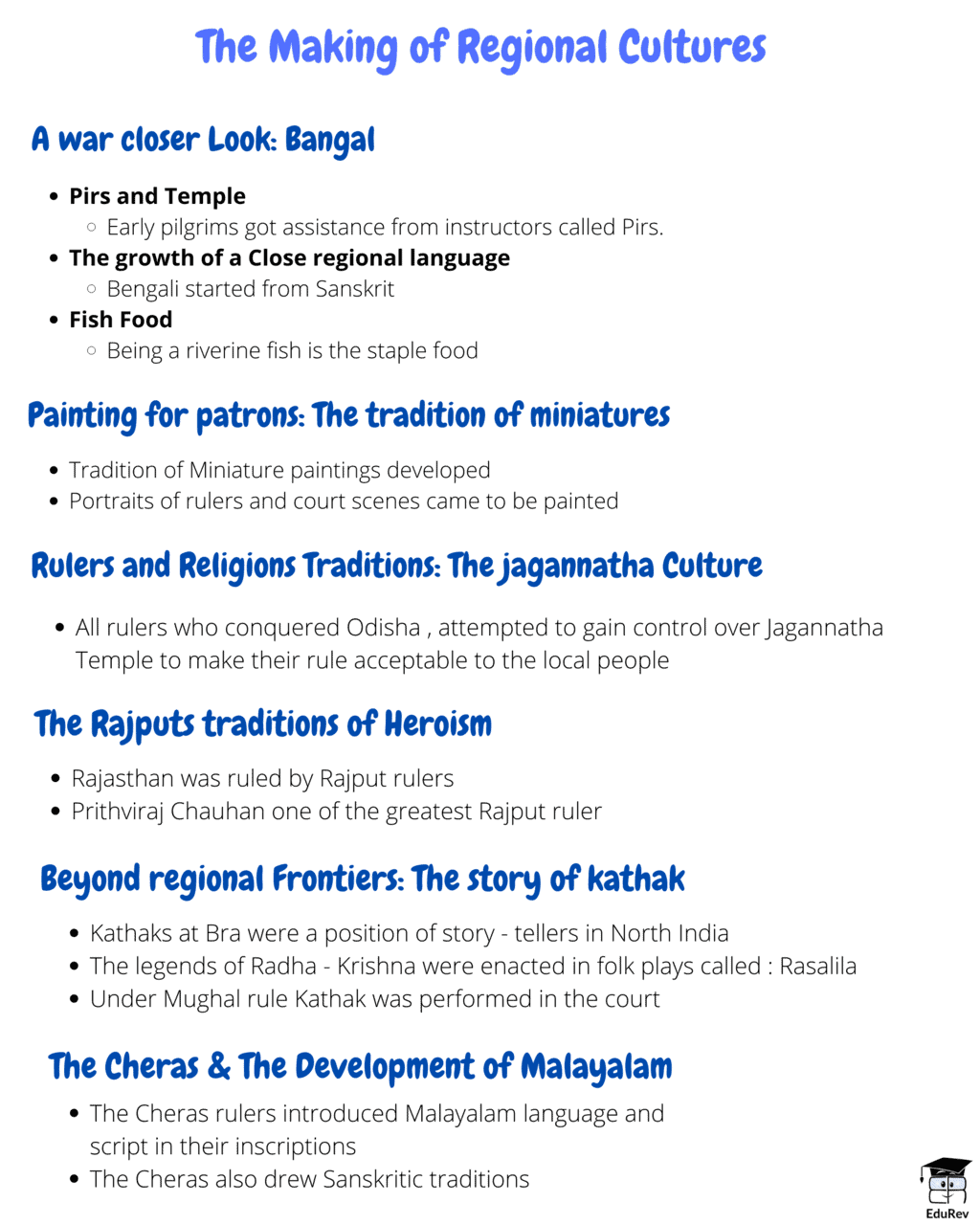UPSC Exam > UPSC Notes > Class 6 to 12 NCERT Mindmaps for UPSC Preparation > Mind Map: The Making of Regional Cultures
Mind Map: The Making of Regional Cultures | Class 6 to 12 NCERT Mindmaps for UPSC Preparation PDF Download

The document Mind Map: The Making of Regional Cultures | Class 6 to 12 NCERT Mindmaps for UPSC Preparation is a part of the UPSC Course Class 6 to 12 NCERT Mindmaps for UPSC Preparation.
All you need of UPSC at this link: UPSC
FAQs on Mind Map: The Making of Regional Cultures - Class 6 to 12 NCERT Mindmaps for UPSC Preparation
| 1. What is the significance of regional cultures in shaping societies? |  |
Regional cultures play a crucial role in shaping societies as they reflect the unique customs, traditions, beliefs, and values of a particular geographical area. They contribute to the identity and sense of belonging of individuals within a community, fostering a shared heritage and creating a distinct cultural fabric. Regional cultures also influence various aspects of society, including language, cuisine, art, music, literature, and social norms, enriching diversity and promoting cultural exchange.
| 2. How do regional cultures evolve over time? |  |
Regional cultures evolve over time through a combination of internal and external factors. Internally, they adapt and transform as new generations reinterpret traditions and customs, incorporating contemporary influences. External factors, such as migration, globalization, and intercultural exchange, also contribute to the evolution of regional cultures by introducing new ideas, practices, and perspectives. This dynamic process ensures that regional cultures remain fluid and responsive to changing societal dynamics.
| 3. What are the economic implications of regional cultures? |  |
Regional cultures have significant economic implications as they often serve as drivers for tourism and local industries. Unique cultural practices and landmarks attract visitors, contributing to the growth of the tourism sector and generating revenue for local businesses. Additionally, regional cultures can be a source of inspiration for artisans and craftsmen, fostering the development of local industries and creating employment opportunities. Cultural festivals and events associated with regional cultures also stimulate economic activity through increased consumer spending.
| 4. How do regional cultures contribute to social cohesion? |  |
Regional cultures contribute to social cohesion by providing a sense of identity and belonging for individuals within a community. They serve as a common thread that unites people, promoting social interaction, cooperation, and mutual understanding. Regional cultural practices, such as festivals and rituals, often involve collective participation, fostering a sense of community and reinforcing social bonds. Cultural heritage preservation efforts also bring people together, encouraging collaboration and shared responsibility for the preservation of regional cultures.
| 5. How does globalization impact regional cultures? |  |
Globalization has both positive and negative impacts on regional cultures. On one hand, it can lead to the erosion of traditional practices and values as Westernized or homogenized cultural influences become more prominent. This can result in the loss of cultural diversity and the dilution of regional identities. On the other hand, globalization can also facilitate the exchange and appreciation of regional cultures on a global scale, promoting cultural diversity and fostering intercultural understanding. It offers opportunities for cultural dialogue, collaboration, and the preservation of endangered regional traditions through international platforms.
Related Searches
















